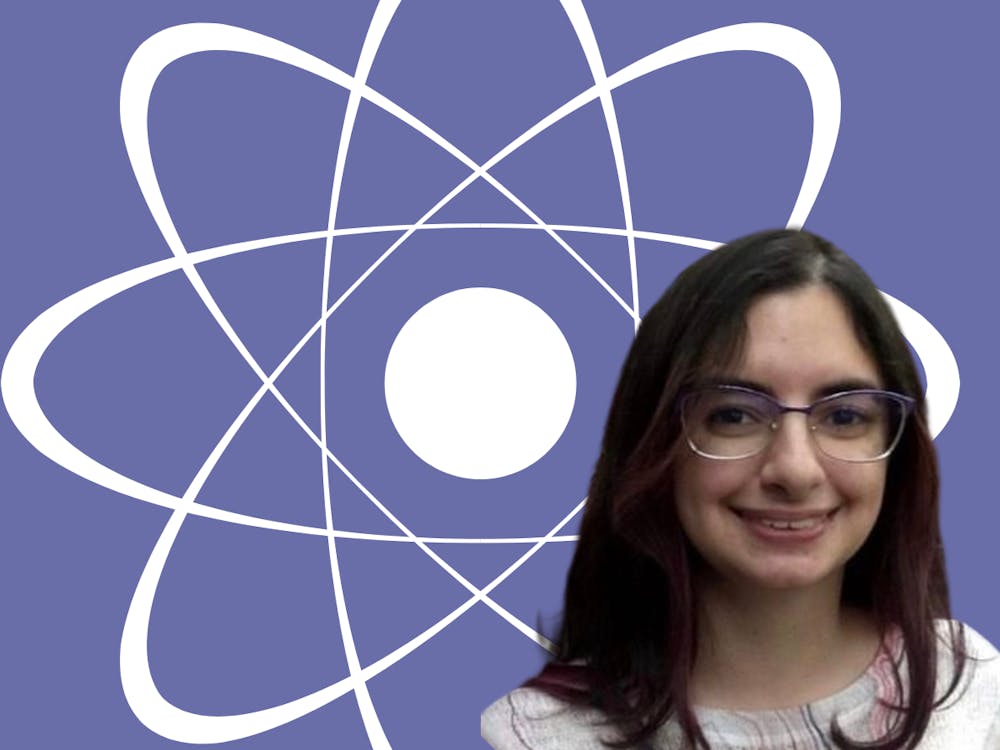Visiting speaker Joanna Behrman, a public historian at the American Institute of Physics, shared the stories of female physicists throughout history last week just after University of Richmond students attended a conference for women in physics at Princeton University.
Behrman gave a talk entitled “More than Marie Curie: Centering Women in the History of Physics” last Tuesday evening in the Ukrop Auditorium.
“You can't tell the history of science without telling the story of all the people who were in the history of science, including women,” Behrman said in her introduction.
The talk focused on ordinary women in physics who were extraordinary in their own ways. It is important to understand the history of science and the history of women in science together, Behrman said.
Behrman discussed women in physics who studied and taught at women’s colleges, and how these institutions aided women in their achievements and provided them access to graduate programs at other institutions.
Behrman earned an undergraduate degree in physics from Harvard University, then went on to receive a Ph.D. in history from Johns Hopkins University. She now works in the Center for the History of Physics at the American Institute of Physics.
As a public historian, Behrman brings academic history to other audiences, such as physicists, school teachers and students.
Behrman’s talk was hosted jointly by the physics department, the history department, the education department and the women, gender and sexuality studies program.
Behrman also gave advice to women who are interested in going into physics.
“Stay true to what you love and have faith that you know what's best for what you are doing. Try not to pay too much attention if someone is discouraging you from the field,” she said.
Behrman, recalling her time as an undergraduate, named three specific instances during her undergraduate studies when she felt isolated as a woman in physics.
The first was when she asked a question during a lecture and the entire class laughed. It felt like everyone else spoke the language, and she didn’t, Behrman said.
Enjoy what you're reading?
Signup for our newsletter
Later, she was working in a laboratory as a research assistant and she was asked how much she thought she should be paid. This was her first job as a research assistant, she said, and she had no idea how to respond. She asked for $12 an hour, and it wasn’t until she heard a male undergrad research assistant asking for a raise from $15 to $18 an hour that she realized she was being underpaid, she said.
Another time, during a summer undergraduate research experience, Behrman worked in a lab with a graduate student.
“It gradually dawned on me that he had no interest in teaching me the science. He was just hitting on me. It became increasingly clear at the point that he started inviting me back to his apartment and saying ‘you could definitely cook dinner for me,’” Behrman said.
She was too embarrassed to tell anyone because it was a small lab, she said.
She still wonders if she left physics because of these experiences or because she truly found something that she loved more, she said.
UR senior Brianna Cantrall is a physics and mathematics double major who recently attended the American Physical Society’s Conference for Undergraduate Women in Physics at Princeton University, along with four fellow female University of Richmond physics students.
The conference took place Jan. 20 to Jan. 22 and allowed Cantrall to get to know more of the women in the physics department at UR, she said.
It was interesting to hear about the experiences of other undergraduate women in physics as well as the speakers who discussed their research and career paths, Cantrall said.
Nobody had the same story, which was encouraging, she said.
“You can do it. It's gonna be hard, but you can do it,” Cantrall said.
At UR, Cantrall said that she felt lucky to feel very comfortable in the physics department, though she has a few friends who have heard or seen comments or actions from professors or students that made them uncomfortable.
At UR, there are fewer female physics majors than male, Matt Trawick, chair of the department of physics, said.
“That’s something that we’re always cognizant of, and we’re always trying to recruit and trying to make sure that women students have good opportunities,” Trawick said.
The department tends to notice any physics majors early on and try to be sure that they have opportunities to do research and meet professors, Trawick said.
There is an effort to build community in the physics department by introducing students to each other, Trawick said.
The physics professors are all very welcoming, and are always looking for students who want to do research. The professors will ask upperclassmen to remind underclassmen that their labs are open for research, Cantrall said.
There are three senior female physics majors at UR. Despite being outnumbered by male physics majors, it never felt like it was a hindrance to her classroom experience, Cantrall said.
Cantrall has felt lucky to take multiple classes with UR’s two female physics professors. There might be a classroom full of male students, but if she looked at the board and saw a woman teaching, she wouldn't feel outnumbered, Cantrall said.
Cantrall plans to continue her studies after she graduates from UR.
“I’d love to go to grad school and get a Ph.D.,” she said. “I’m thinking of astrophysics right now," She said.
Contact news writer Mary Margaret Clouse at marymargaret.clouse@richmond.edu
Support independent student media
You can make a tax-deductible donation by clicking the button below, which takes you to our secure PayPal account. The page is set up to receive contributions in whatever amount you designate. We look forward to using the money we raise to further our mission of providing honest and accurate information to students, faculty, staff, alumni and others in the general public.
Donate Now



